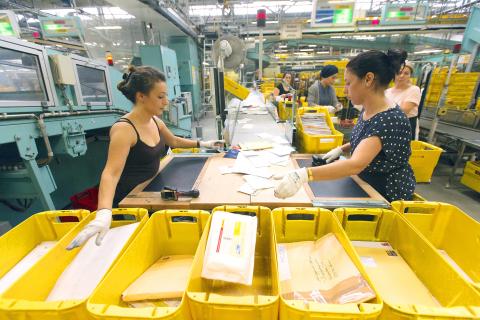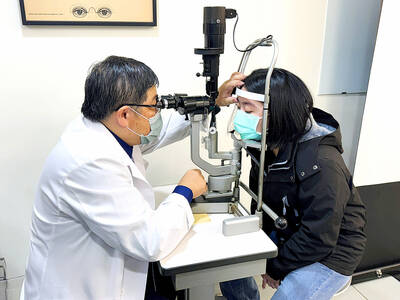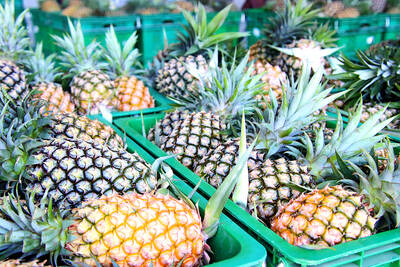A lot of people send postcards back to Taiwan when they are traveling abroad, but when it comes to writing the country name in the address column, should they put “R.O.C.” (the Republic of China), Taiwan or Formosa? An Internet user exercised her spirit of experimentation by sending out postcards with the different country names on them and then waited to see which would be the first to arrive.
The three postcards had the same address, except for the country names, which were, respectively, “Republic of TAIWAN,” “Republik of Formosa e Pescadores” and “Republic of China.” All were mailed from Berlin, Germany, on April 17.
As it turns out, the two postcards that had Taiwan and Formosa written on them both arrived in Taiwan on April 25, whereas the one with the “Republic of China” on it took a month, not arriving until May 19. The Internet user said the experiment showed that the Deutsche Post recognizes Taiwan and Formosa and that writing “R.O.C.” only will make foreigners think it means “China,” and the People’s Republic of China is the only China that is internationally recognized.

Photo: Martin Leissl/Bloomberg
照片:彭博攝影記者 Martin Leissl
(Liberty Times, translated by Ethan Zhan)
許多人去國外旅遊都會寄明信片回台,但在地址欄填寫國家名稱時,到底是該寫「R.O.C.(中華民國)」、「Taiwan(台灣)」還是「Formosa(福爾摩莎)」?就有網友發揮實驗精神,同時寄出寫著不同收件國名的明信片,然後看哪一封最快到達。
這三張收件地址都相同僅國名不同的明信片,國名分別寫的是「Republic of TAIWAN(台灣)」、 「 Republik of Formosa e Pescadores(福爾摩沙與澎湖)」及「Republic of China(中華民國)」。三封同時於四月十七日從德國柏林寄出。
結果,寫著台灣與福爾摩沙的兩張明信片四月二十五日就同時抵達台灣,反觀寫著中華民國的那張,拖了一個月,到五月十九日才收到。這名網友表示,實驗證明德國郵政是認得台灣與福爾摩沙的,寫R.O.C.只會讓外國人士想到China,而國際上只承認對岸那個P.R.C.。
(自由時報)

A: Recently, I’ve been seeing mosquitoes flying around in front of my eyes. The doctor said it’s the “flying-mosquito disease.” B: Flying mosquitoes? What a strange name. A: They’re actually called “floaters” in English, meaning floating debris. When fibrous substances in the vitreous body inside the eyeballs increase, floaters can appear in the visual field. B: Oh my goodness. Can you get rid of them? A: According to ophthalmologist Horng Chi-ting’s research, taking the enzymes of certain fruits is likely to help reduce floaters. A: 我最近一直覺得眼前有蚊子飛來飛去,結果醫生說是「飛蚊症」。 B: 飛蚊症?好奇怪的病名。 A: 英文名稱叫「floaters」, 也就是漂浮物的意思。 因為眼球的玻璃體中纖維化物質增多,導致視野出現漂浮物。 B: 天啊!要怎麼把蚊子趕走? A:

In Taiwan, people can use a platform to rent a power washer for a weekend or share unused garage space for someone’s storage needs. These are examples of the sharing economy, a consumption model that has gained widespread adoption worldwide. This approach allows people to rent or share assets like cars, homes or even services, typically through online platforms. This innovative model poses a simple yet powerful question: why purchase infrequently used items when sharing is more practical? By making useful but idle resources accessible, the sharing economy turns them into sustainable opportunities. Internationally, platforms like Airbnb and Uber have popularized

Bilingual Story is a fictionalized account. 雙語故事部分內容純屬虛構。 I stand by the Miluo River as dusk falls. The court betrayal is too much. I served Chu with loyalty. I forged alliances and fought corruption. But the whispers of jealous courtiers, the murmurs of treason, spoke louder. The king cast me out. The water looks calm. It promises peace. I step in. The river is cold against my legs. I hear shouts behind me — fishermen calling my name. I keep walking. The calls grow louder, but I do not turn around. The water rises to my chest. It pulls at me. I

A: What types of fruit enzymes should we take to help reduce eye floaters? B: According to a study published in the “Applied Sciences” journal by Taiwanese ophthalmologist Horng Chi-ting, pineapple, papaya and fig supplements can improve symptoms. A: Pineapples are in season now, so you should munch on more of those to get rid of floaters. B: Not quite. Enzymes can be damaged by our stomach acid if we eat the fruit directly. The doctor says taking fruit enzyme capsules is better for absorption. A: Most importantly, we should reduce our use of personal electronics to prevent floaters from